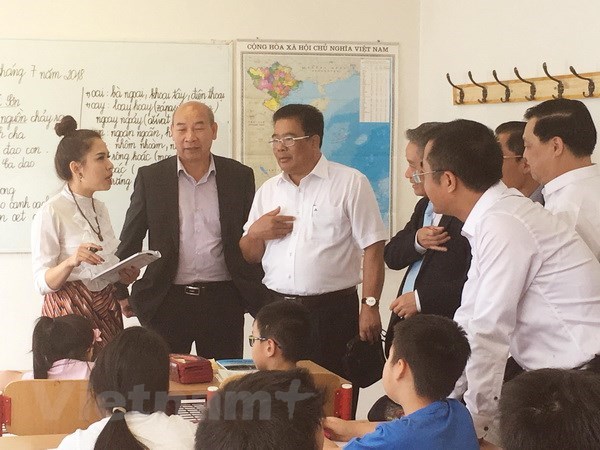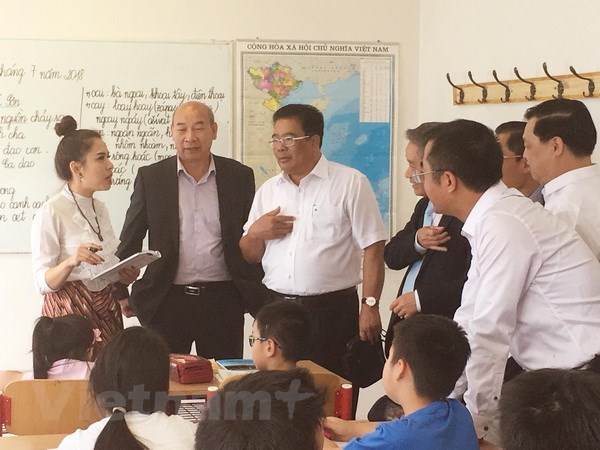
The Vietnamese Embassy in the Czech Republic held a ceremony in Prague on October 27 to honour 47 Vietnamese students and postgraduates with excellent performance in the 2017-2018 academic year.
A delegation from the Party
Committee of the Central Agencies Bloc visit a Vietnamese language class in
Prague (Photo: VNA)
Addressing the event,
Ambassador Ho Minh Tuan emphasised that Vietnamese people in the Czech Republic
are always seen as an exemplary united and strong community who have made great
efforts to uphold beautiful traditions of Vietnam.
The traditional fond of learning and passion for knowledge have been maintained
and passed down to younger generations by expatriates in the Czech Republic.
Many students have achieved proud academic results and been considered bright
examples in the local society, he said.
The diplomat added that the students themselves and their generation will be
the ones substantially helping to change Czech people’s view of Vietnamese who
are not only successfully in doing business but also greatly contribute to the
Czech society, their Vietnamese homeland, as well as the two countries’
friendship.
Tuan also highly valued practical activities by theUnion of Vietnamese
People Associations in Europe and the Vietnamese People Association in the
Czech Republic to encourage and support expatriate students.
At the ceremony, the diplomat suggested rewarding students with outstanding
achievements in learning Vietnamese so as to promote the teaching and learning
of this language in the overseas community. It said that Vietnamese is an
important means for them to understand and uphold traditional culture and
connections with the homeland.
According to the Czech Statistical Office, there were more than 58,000
Vietnamese in the country as of the end of 2016. In 2013, the European country
recognised the Vietnamese community here as one of its ethnic groups.
Source: VNA
In the spirit of "Party members go first, the people follow”, all households of Party members in the Doan Ket sub-region in Da Bac town, Da Bac district, voluntarily removed gates and fences, and donated land when the road expansion project passed through their properties. Inspired by their example, 68 households in the sub-region quickly followed suit, contributing over 1,400 sq.m of residential and perennial cropland to widen the main road through the residential area. The exemplary role of Party members in Doan Ket stands as a shining example of studying and following President Ho Chi Minh’s thought, morality, and lifestyle.
The Hoa Binh provincial People's Committee held a monthly meeting on May 29 to assess the implementation of socio-economic development tasks in the first six months of 2025, the progress of key projects, and some other important issues.
During his lifetime, President Ho Chi Minh always expressed his deep affection and special concern for children and youth. He once emphasized: "Caring for and educating children well is the responsibility of the entire Party and the entire people”; "First of all, the family (i.e. grandparents, parents, siblings) must do this job well”. "the Party Committees…, the Children’s Committee, the Youth Union, the education sector, and all related organizations must have specific plans to ensure children grow healthier and more progressive”. His teachings has been remaining valuable and serving as the guiding principles in the work of protecting, caring for, and educating children. In line with this ideology, Hoa Binh Province has continuously been prioritizing and investing resources in the well-being of children in recent years.
Mr. Nguyen Phi Long, the alternate Member of the Party Central Committee and Secretary of the Provincial Party Committee chaired the meeting of the Standing Committee of the Provincial Party Committee to provide opinions on several investment projects within the province. There was the attendance of Ms. Bui Thi Minh, the Permanent Deputy Secretary of the Provincial Party Committee and Chairwoman of the Provincial People’s Council; Mr. Bui Đuc Hinh, the Deputy Secretary of the Provincial Party Committee and Chairman of the Provincial People’s Committee and other members of the Standing Committee; the leaders from other departments, agencies, and some localities.
The Standing Board of the Vietnam Fatherland Front (VFF) Committee of Hoa Binh province held a meeting on May 28 to honour outstanding village elders, village heads, and reputable individuals from local ethnic minority and religious communities.
In mid-May, the provincial Museum organised an exhibition named "Duoi la co Dang Cong san Viet Nam quang vinh” (Under the flag of the glorious Communist Party of Vietnam). This meaningful activity took place in the joyful atmosphere to celebrate the country's major holidays and the Party congresses at all levels for the 2025-2030 term, towards the 14th National Party Congress.



